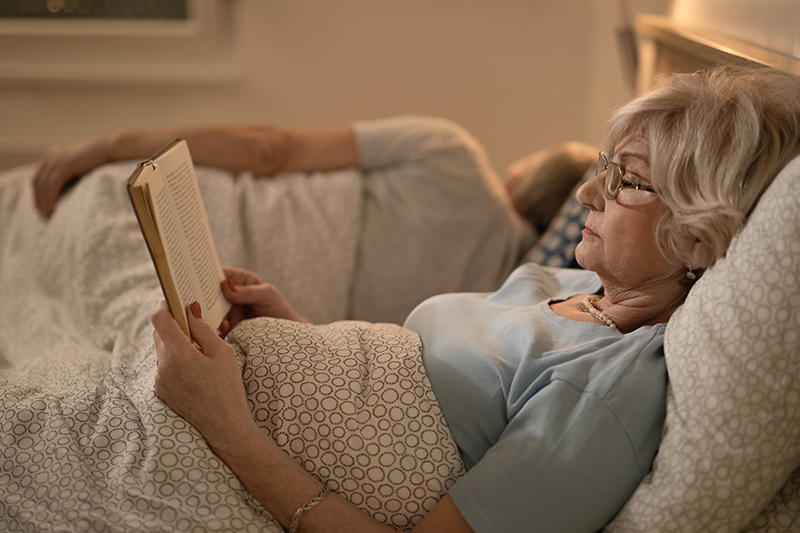26 Apr 2023

We are all too aware of the importance of a good night’s sleep, so we asked Dr Ross Walker for his top tips on how to improve your sleeping habits and patterns.
1. The quality of your sleep depends on the quality of your waking hours. During your waking hours it is important to look at these five features:
-
Your nutrition.
-
Your level of fitness.
-
Your work habits.
-
Any other underlying illnesses such as conditions leading to chronic pain, which may disturb your sleep.
-
Your current psychological state.
2. Preparation for Sleep
Activities to avoid before going to sleep:
-
Family or emotional problems including phone calls one hour before sleep.
-
Exercise two hours before sleep increases our body temperature and makes it more difficult to get off to sleep.
-
Eating two hours before sleep also releases a whole lot of hormones that can keep you awake.
-
Although alcohol may get you off to sleep, it profoundly affects your sleep patterns, as do stimulants, such as coffee. Alcohol and caffeine should be avoided at least three hours before you go to sleep.
-
Falling asleep in front of the television or with the radio or light on.
Activities to encourage before going to sleep:
-
Reading for half an hour before sleep.
-
In the half hour before sleep, a warm bath or a shower.
-
In the hour before sleep, a warm, non-caffeinated based drink such as warm milk or chamomile tea.
-
Relaxation CDs or meditation.
3. The Sleeping Environment
It is important to look at the feng shui of your bedroom. You should have no electronics such as televisions, computers or fax machines anywhere near the bedroom.
Some people sleep with a mobile phone underneath or near their pillow, but these should be kept well away from the head. Electromagnetic radiation can really disrupt sleep. It is always important to consider how comfortable your bed and pillows are. Your sleeping partner can certainly disrupt your sleep if they are snoring, have restless legs, have breathing problems or coughing.
What is happening outside the bedroom is also of importance. Some people may live near a main road where there is excessive traffic noise. There may be noisy animals or noisy neighbours causing sleep disruption. Of course, one of the big sleep killers is young children, especially young infants who can often disrupt a parent’s sleep throughout the evening.
There is also the five “R’s” of the sleeping environment.
-
Routine. Go to sleep and wake up at the same times. 70% of us are larks and 30% are night owls, i.e. the larks go to bed early, wake up early and the night owls go to bed late and wake up late.
-
Relax. Don’t go to bed stressed, e.g. following an argument.
-
Reducing temperature. It is important to go to sleep in a cool room and/or have a warm shower.
-
Relationships. Poor relationships at either home or at work can lead to poor sleep.
-
Ready. Know when your body is ready. Don’t go to sleep when you are wide awake as you certainly won’t be able to sleep well.
4. Sleep Disorders
-
Insomnia affects 20 – 30% of the population.
-
Sleep apnoea which is an extremely common condition that often requires medical assessment.
-
Specific sleep disorders such as restless legs, periodic limb movements and narcolepsy also require sleep specialist assessment.
-
Medical disorders such as cardiorespiratory disease; Chronic pain syndromes and other illnesses such as endogenous depression can also have a profound effect on sleep.
-
The specific categories of shift work and jet lag also need consideration here.
5. The Use of Sedatives
Before embarking on the use of sleeping pills it is always better to try the natural therapies available. Many of my patients report benefit using a Floww device & an Earthing blanket.
There are many good natural therapies on the market which do have a benefit here. A discussion with your chemist or naturopath is the best approach to determine what may suit you best.
If you do require sleeping pills, keep them to a bare minimum, using them only sparingly and under the advice of your doctor.
Recent medical studies have shown that having good quality sleep, which means between seven to eight hours a night, is as good for your body as not smoking. It is important to cultivate a good quality regular sleep habit.
As for all things relating to your health speak with your GP or a relevant medical professional. For all your financial health contact PSK on 8365 8300 or visit psk.com.au
General Advice Warning - Any advice included in this article has been prepared without taking into account your objectives, financial situation or needs. Before acting on the advice, you should consider whether it’s appropriate to you, in light of your objectives, financial situation or needs.
